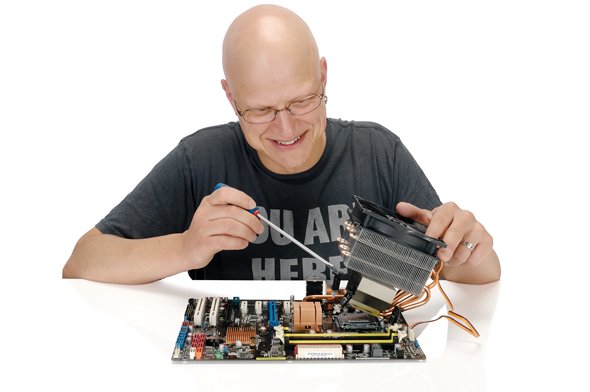
We know PC Gaming can be hard. We know stuff breaks, and we know how painful and brutal it can feel when your PC fails. We think we can help. Every week, Adam Oxford , PC Gamer's resident hardware expert will be answering your PC game hardware and software questions. If you want to submit your own questions, let us know in the Tech Folder on the forum, in the comments below, or via email. Let's get on with the show.
Dead motherboard
A few weeks ago I tried to power up my PC and was met with a black screen. I tried the usual things, including checking cables, connections, unplugging external devices etc... I was starting to think that the graphics card had gone, but eventually realised that the motherboard wasn't getting to POST - no reassuring "beep" of success to let me know everything was working. I tried a few things, resetting the BIOS, replacing the battery on the motherboard, unplugging all hard drives and eventually stripped everything down so I just have the motherboard, PSU, processor and 1 stick of RAM connected - it still won't post. My question is really: is there anything else I can try to see what is wrong before I spend money on something that isn't the problem? And, if I do have to spend money, what should I replace first motherboard or PSD - I suspect one of these is the culprit but which is more likely?
PCG Bad news I'm afraid. Short of trying everything again in the stripped down PC, there's not a lot more you can do for this one. I have seen similar motherboards rise from the dead, though, so as a last ditch attempt I'd suggest resetting the BIOS again now that everything is out, and re-seating the CPU too – together with applying new thermal paste for the heat-sink. You could also look for a recovery BIOS on the motherboard manufacturer's website, to see if there's a way of flashing your board back to life.
Normally, though, I'd suspect the PSU before the motherboard – unless you're overclocking there's little reason a healthy motherboard should suddenly give up like that. You didn't mention your motherboard model, but some have contact points built in for attaching a multimeter to check the PSU's health. If it's not supplying power, you know what to replace.
[MPU]What Wattage?
How important is it to get the right wattage from a PSU? How do I know what I need? Is there any danger in having too much?
BJRose
Keep up to date with the most important stories and the best deals, as picked by the PC Gamer team.
PCG The only thing that's endangered by feeding your PC too many Watts is your wallet. After 600W or so, the price of decent, reliable power supplies gets painful – and it's an unnecessary expense. Totalling up the power requirements of your PC is like that scene in Apollo 13 where Ed Harris is trying to get Tom Hanks back to Earth on batteries. You tot up what each component needs (for example, 150W for the CPU, 200W for the GPU, etc) and then add 50-100W for good luck. If your PC needs 500W to run flat out, that's what it will use regardless of the size of your supply.
Unless you're running dual graphics or a large number of hard-drives, you should be OK with a power supply rated 600-650W.
More important is the efficiency of the PSU. This tells you how much energy is lost in the conversion from mains power to the DC supply your PC needs. An efficiency of 80% or more is good, anything less means you're spending a lot of money warming up your case.
Should I liquid cool?
I want to change to liquid cooling for my graphics card and processor. Are there any tips you can give me or am I changing to much?
Kris
PCG Personally I'm not convinced by water cooling unless you're overclocking, as there are plenty of cheap air coolers for CPUs which outperform most liquid units and run quieter too - particularly if you have a big case with plenty of room for airflow. I find the biggest problems with noise tend to be graphics cards and power supplies.
Liquid cooling can help with graphics card noise, but changing the cooler on a graphics card can be a real pain to do and you mentioned this is your first PC build. My advice would be to build the PC using the standard coolers first, and once it's up and running look at adding water cooling if you need it when you've got the experience of a full build under your belt.
PC Gamer is the global authority on PC games—starting in 1993 with the magazine, and then in 2010 with this website you're currently reading. We have writers across the US, Canada, UK and Australia, who you can read about here.


